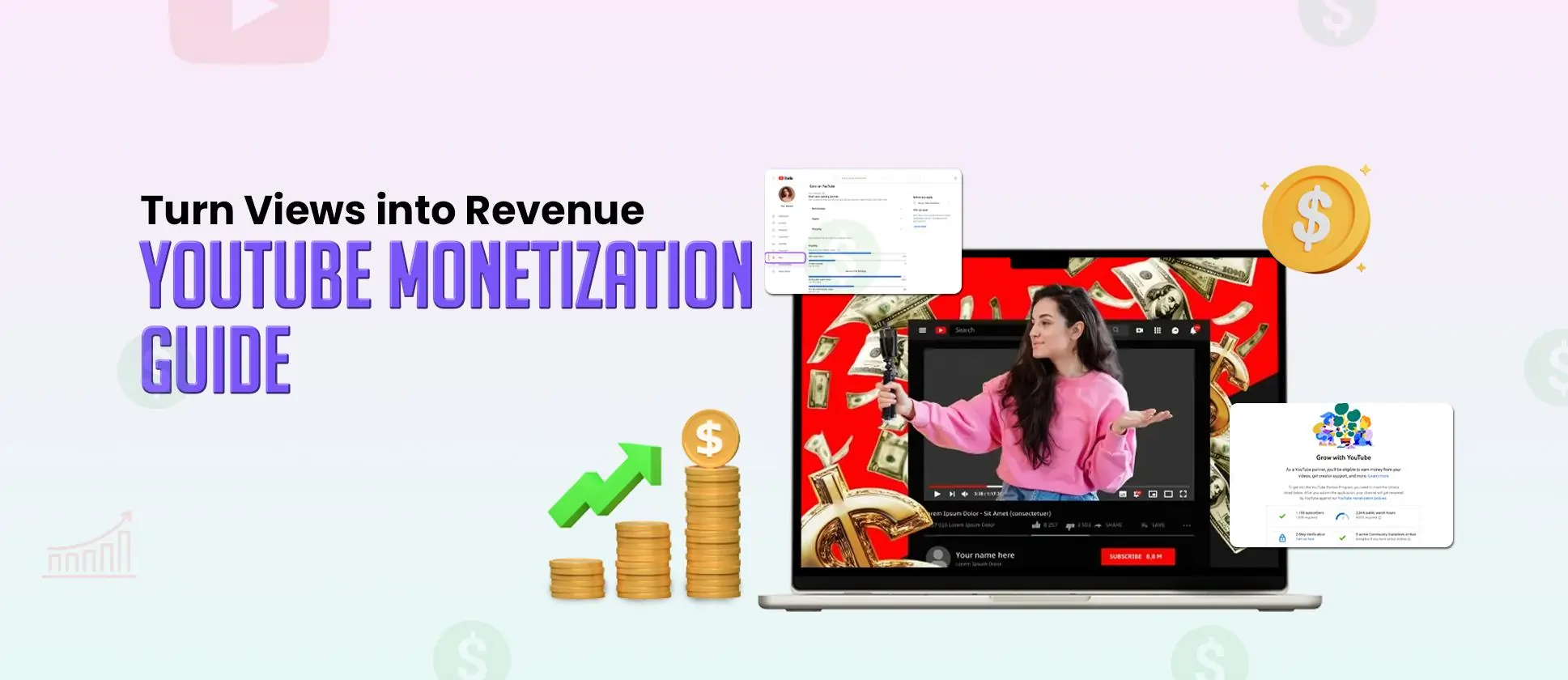Quick Summary
TL;DR: In this informative blog, you can explore the YouTube Monetization requirements in 2026, and we tried to cover mistakes to avoid demonetization. The Partner Program has new tiers, there are updated monetization rules for Shorts, and creators can access multiple income sources. To build a stable income, you need a good strategy, consistent effort, and the right mix of content formats. #tldr
- Core Factors:
Eligibility → Watch Time & Shorts Views → Content Niche → Policy Compliance → Revenue Diversification → Audience Engagement → Mobile Optimization
- Monetization Streams in 2026:
Ad Revenue → YouTube Premium → Memberships → Super Chat & Super Stickers → Super Thanks → Brand Sponsorships → Merchandise Shelf → Shorts Revenue Sharing
- Top Insights:
Two-tier monetization: Standard (1,000 subs) and Early Access (500 subs) → Shorts are now a real earning channel with faster growth potential → Long-form still provides stable revenue and stronger evergreen value.
- Main Takeaway:
YouTube Monetization in 2026 rewards creative creators. By consistently uploading content and using Shorts, long-form videos, fan funding, and brand partnerships, you can build a resilient channel that earns from multiple sources.
With millions of videos going live on YouTube every day, it’s tough for brands and creators to get noticed. A lot of people still upload videos without any real plan, just hoping one will blow up. The truth is, real growth happens when you move with a proper strategy. Having a solid plan helps your content get engagement, keep your audience coming back for more, and get YouTube monetization. To increase your YouTube views, it’s essential to stay up-to-date with the latest trends in how people watch and engage.
According to Statista, YouTube now reaches more than 2.7 billion active users each month, surpassing almost every other social channel in terms of reach and influence. And it’s not just about view counts. YouTube now offers shorts, new ad formats, and community tools that make marketing more effective. These changes can help drive sales and support long-term growth for brands. The main question for 2026 is whether your strategy is ready to change.
Ready to monetize smarter?
Why YouTube Monetization Matters in 2026
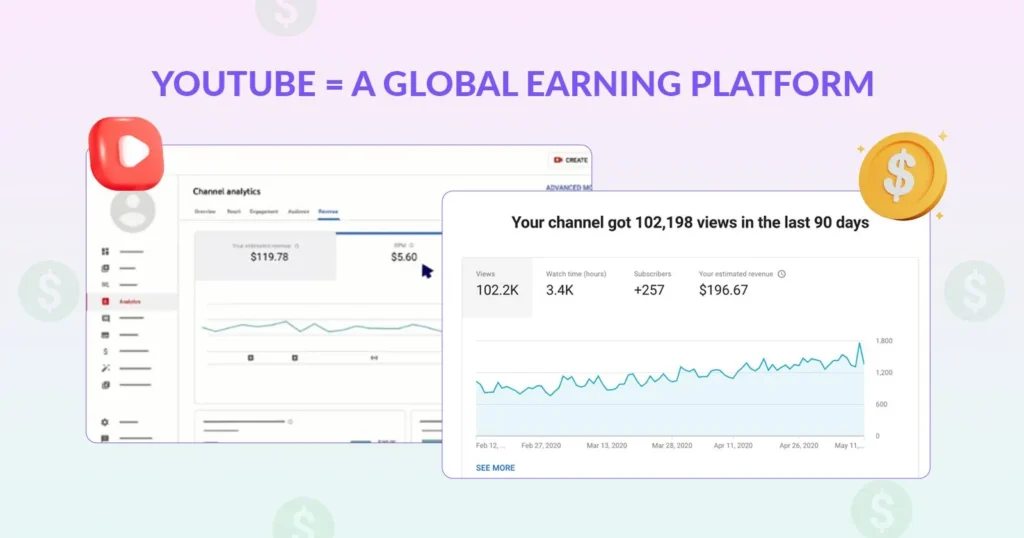
YouTube has become a huge money maker and a major part of the creator economy. Creators pulled in over $70 billion through YouTube’s Partner Program in 2024, according to Variety, and that number looks like it will keep going up. With more people joining the platform every day, knowing how YouTube monetization works is no longer optional – it’s what separates casual posting from building something sustainable.
What’s exciting is how many ways there are to earn now. Ads are still part of the picture, but they’re only the start. You can bring in revenue from channel memberships, livestream features like Super Chat, branded partnerships, and the fast-growing world of Shorts monetization. Before that, you need to create a YouTube content calendar, which will help you upload new videos at a proper schedule. For creators, that means more freedom to diversify income.
For brands, it opens the door to working directly with YouTubers who already have the audience you want to reach. Now, YouTube has become a marketplace where everyone, creators, businesses, and viewers, gets something valuable out of the exchange.
YouTube Monetization Streams in 2026
| Revenue Stream | Requirements | Benefits | Best For |
|---|---|---|---|
| Ad Revenue (Partner Program) | 500 subscribers + 3,000 watch hours (or 3M Shorts views in 90 days) | Steady income from ads placed on videos | Long-form creators, channels with consistent views |
| Channel Memberships | 500+ subscribers | Recurring monthly revenue, exclusive perks for fans | Communities, educators, niche creators |
| Super Chat & Super Stickers | Monetized channel, 18+ years old | Real-time support during livestreams, fan interaction | Live streamers, event-based content |
| Shorts Monetization | 3M+ Shorts views in 90 days | Fast-growing revenue stream with high virality | Short-form creators, trend-driven content |
| Brand Sponsorships | No set threshold, but audience trust is required | Higher payouts, long-term partnerships | Influencers, brands with loyal audiences |
| Merchandise Shelf | 500+ subscribers, merch integration enabled | Sell products directly on the channel | Lifestyle creators, personal brands |
Still leaving YouTube money on the table?
Updated YouTube Monetization Requirements 2026
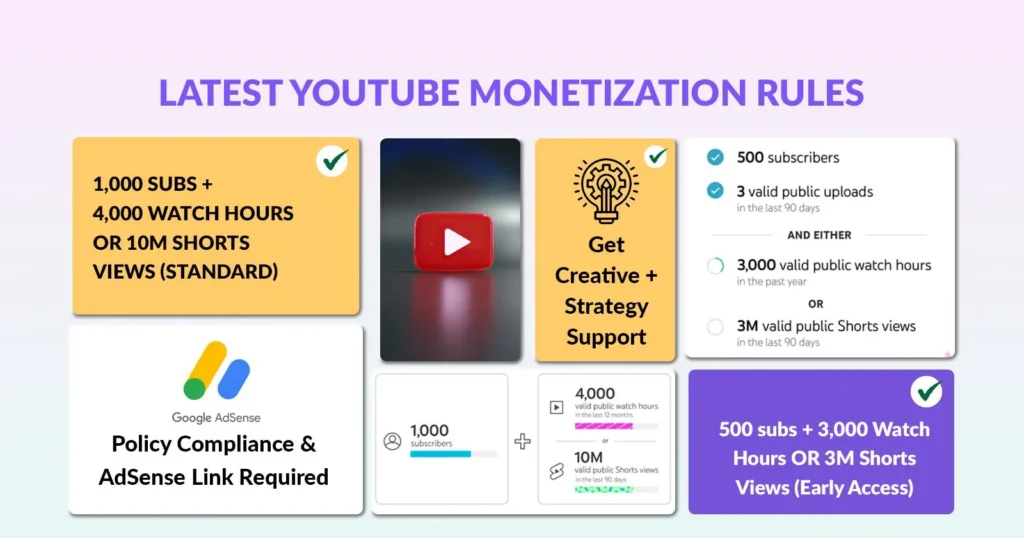
If you are planning to monetize your YouTube channel in 2026, do remember that the platform has changed its rules. YouTube now has two ways to join the Partner Program – a standard tier and an early-access tier. Both pathways are designed to support emerging creators in monetizing their content while ensuring the platform maintains its quality and integrity. The following are the updated requirements for YouTube monetization.
YouTube Policy Updates Today 2026
In January 2026, YouTube made an important update to its monetization rules. This update eases restrictions on sensitive topics like self-harm, abuse, and suicide, as long as these issues are presented in a non-graphic or dramatized way. Eventually content creators can earn full ad revenue from these videos. Instead, stricter rules still apply to content about child abuse and eating disorders.
The update also brings new features to improve the viewing experience. These include “reclinability” for watching on TV and options for dual live streaming in both horizontal and vertical formats. YouTube has also clarified its policies on drugs and terrorist organizations. Overall, the goal is to balance the earnings of content creators with the needs of advertisers and viewers.
YouTube Partner Program Eligibility
- Standard Tier: 1,000 subscribers + 4,000 public watch hours in the last 12 months, or 10 million valid Shorts views in the last 3 months.
- Early-access Tier: 500 subscribers + 3,000 public watch hours in the last 12 months, or 3 million valid Shorts views in the last 3 months.
Channel & Policy Compliance
Meeting the required numbers is not enough. Your channel must follow YouTube’s community guidelines, respect copyright rules, and ensure that your content is suitable for advertisers. If you break these rules, you could face delays or a complete block on YouTube monetization.
Technical Requirements
Before applying, make sure.
- Your channel is linked to an active Google AdSense account.
- Two-factor authentication (2FA) is enabled on your Google account for extra security.
YouTube Monetization Requirements Standard vs Early-Access Tier
| Requirement | Standard Tier | Early-Access Tier |
|---|---|---|
| Subscribers | 1,000 | 500 |
| Watch Hours (12 months) | 4,000 | 3,000 |
| Shorts Views (90 days) | 10M | 3M |
| Policy Compliance | ✅ Required | ✅ Required |
| Linked AdSense | ✅ Required | ✅ Required |
| 2FA Activation | ✅ Required | ✅ Required |
Main Revenue Streams for YouTube Creators in 2026
In 2026, YouTube will provide creators with more ways to earn money. Ads are still important, but they are not the only option anymore. Creators can also make money from premium subscriptions, memberships, and collaboration tools that rely on support from their fans. These options help creators turn their channels into successful businesses.
Ad Revenue Sharing
Most creators start by using ads. Ads come in different types: pre-roll ads play before a video, mid-roll ads appear during the video, and smaller ads like overlays or display ads. Creators earn 55% of ad revenue, while YouTube keeps 45%. This may not seem like a lot at first, but when a video becomes popular, earnings can add up quickly. For many creators, this is still a major source of income.
YouTube Premium Revenue
Premium adds another layer. Even if your viewers never see ads, you still get paid when Premium subscribers watch your videos. YouTube takes the subscription pool and divides it based on watch time. So, if people spend hours on your content, you get a fair cut. It’s a quiet but steady way to build earnings, especially if your channel has a loyal audience that likes to binge.
Fan Funding Features
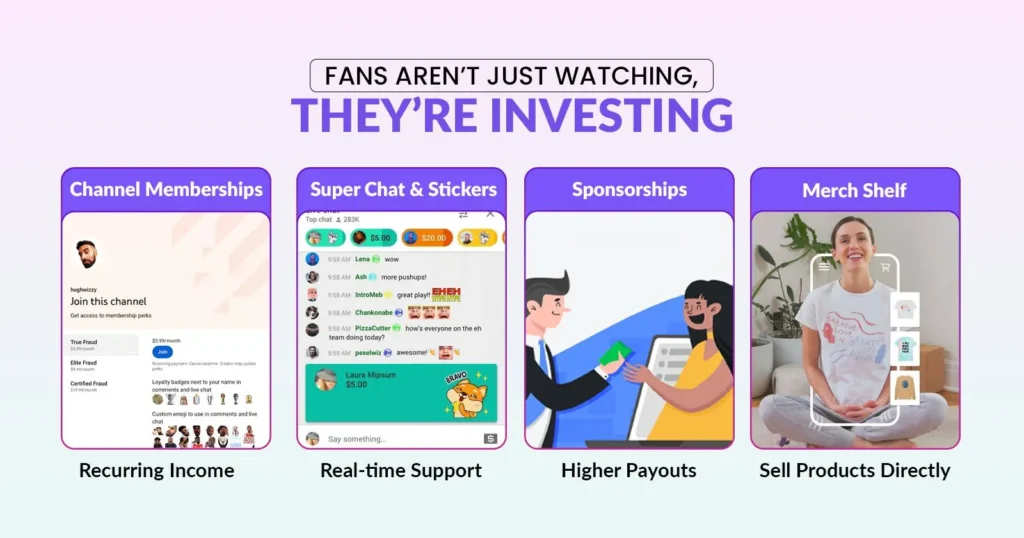
Audience engagement is a great way to support channels, and you can check their interests by regularly monitoring the YouTube analytics. Channel memberships provide fans with access to exclusive content like badges and special clips.
Live streams also become more interactive with features like Super Chat and Super Stickers, which let viewers pay to have their messages shown on screen. Additionally, with Super Thanks, viewers can give a quick tip on any regular video. It’s simple, but for creators, these little gestures add up fast and show who’s really invested in the content.
Merchandising & Shopping Features
Merchandising has always been a part of creator culture, but now YouTube makes it easier. The shopping tab lets you feature products directly under videos or during lives, so fans don’t have to leave the platform to grab something. An e-book, or a digital preset pack, is a natural way to turn viewers into paying customers while keeping them connected to your brand.
Brand Sponsorships & Partnerships
Many creators believe that brand deals lead to real income. Brands want authentic connections with audiences, and creators are the bridge. A compelling video or insightful review can deliver a more impactful message than traditional ads.
New Opportunities with YouTube Shorts Monetization
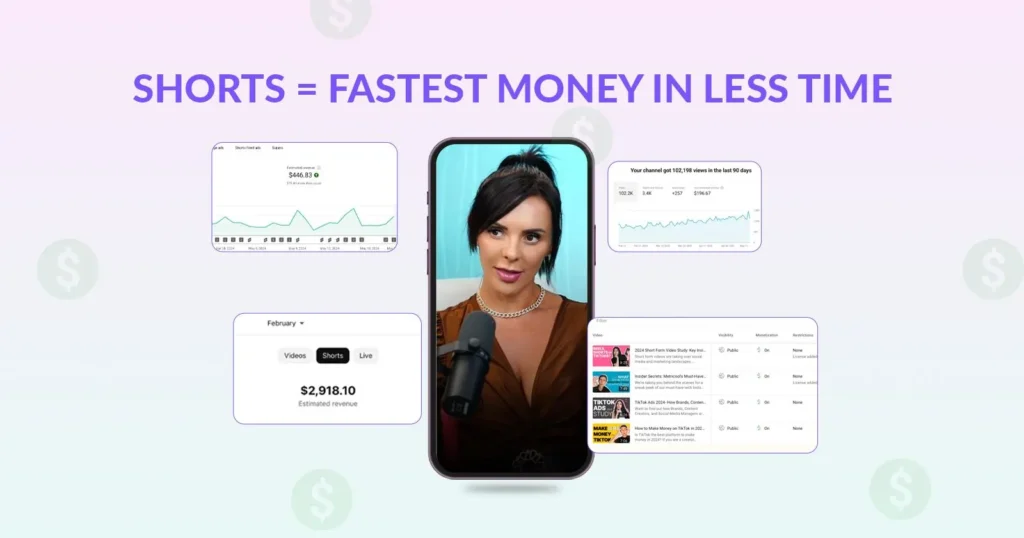
YouTube Shorts has turned into more than just a way to grab attention quickly. Since ad revenue sharing for Shorts rolled out in 2023, it’s grown into one of the fastest-expanding income streams for creators. By 2026, Shorts monetization isn’t just an add-on, it’s a serious part of how channels grow revenue. Creators who know how to balance short-form videos with long-form content are finding new ways to scale without relying only on traditional ads.
Monetization requirements are now a little more flexible. Channels can qualify through the standard path of 10 million Shorts views in 90 days, or they can enter early with the 3 million view threshold under YouTube’s new access tier. This shift makes Shorts a realistic path to earnings even for smaller creators who don’t yet have a big subscriber base.
YouTube Shorts Monetization Requirements 2026
If you’re planning to make Shorts a key part of your monetization strategy, a few simple habits can make the difference:
- Hook fast – you have just a few seconds to stop the scroll.
- Design for mobile – vertical format, clear visuals, and captions matter most.
- Stay consistent – regular posting builds momentum in YouTube’s algorithm.
- Blend creativity with strategy – entertaining Shorts do well, but Shorts tied to tutorials, quick wins, or trending sounds often perform better.
- Use CTAs naturally – a subtle prompt to subscribe or check a longer video can turn a short clip into a long-term relationship.
Shorts aren’t replacing long-form, but they’re now a proven way to monetize faster and reach audiences that wouldn’t otherwise discover your channel. If you’re serious about scaling with Shorts and want editing support that matches your growth goals, exploring the ShortVids pricing plans can give you a clear idea of how professional video editing fits into your strategy.
Comparison: YouTube Shorts vs. Long-Form Monetization in 2026
| Feature | Shorts Monetization | Long-Form Monetization |
|---|---|---|
| Eligibility | 10M views (90 days) or 3M views (early tier) | 1,000 subs + 4,000 watch hours |
| Revenue Model | Ad revenue share on Shorts feed | Pre-roll, mid-roll, display, overlay ads |
| Growth Speed | Fast exposure, quick subscriber growth | Slower, but builds deeper engagement |
| Content Lifespan | Shorter shelf life, trends-driven | Evergreen potential, higher search value |
| Best for | Discovery, virality, and younger audiences | Tutorials, explainers, consistent revenue |
| Cross-Promotion Value | Drives traffic to long-form videos | Supports brand authority and retention |
Pro Tip – Combine Shorts with Long-Form for Maximum Impact
Use YouTube shorts to tease, highlight, or preview your long-form videos. This way, your channel benefits from both the reach of short-form and the stability of long-form monetization.
Best Practices to Maximize Your YouTube Monetization in 2026
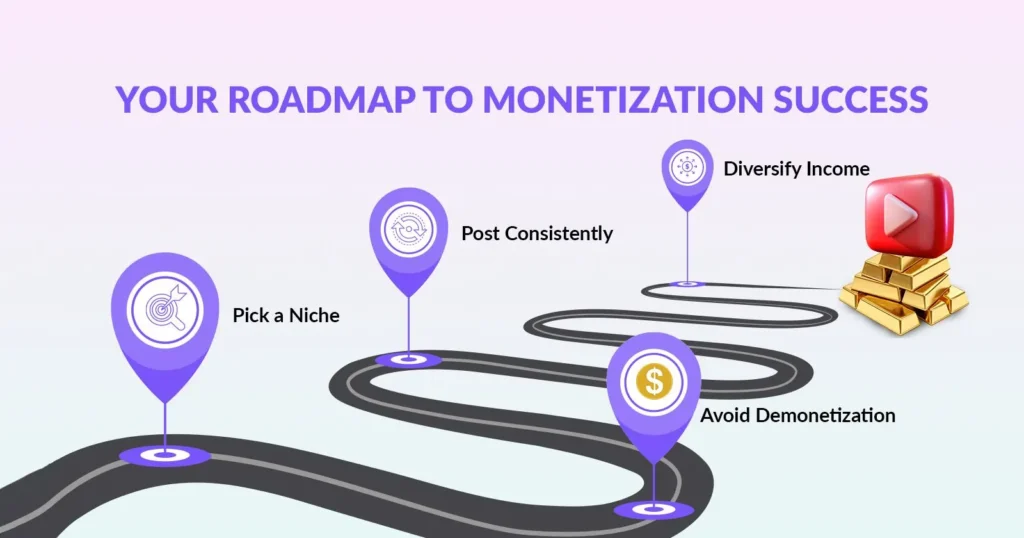
Monetizing on YouTube has become more competitive than ever, and creators who want to thrive in 2026 need to approach it with a clear strategy. Success is about aligning your content, format, and revenue streams with how the platform and audiences are evolving. Creators can also benefit from learning about AI Prompt Engineering in content creation, since it helps generate better video ideas, scripts, and hooks for YouTube. Here are a few areas to focus on.
Content & Niche Strategy
One of the biggest drivers of growth is clarity. Stick with a niche your audience values, and show up consistently. Whether you focus on tutorials, reviews, or entertainment, being known for something makes it easier to attract loyal subscribers.
Pair that with SEO-friendly titles, tags, and descriptions so YouTube knows exactly who to show your content to. Brands are already experimenting with AI in marketing to refine targeting, personalize campaigns, and even predict which types of YouTube content will perform best.
Compliance First
Nothing slows growth faster than losing YouTube monetization over a policy strike. Keep your content within YouTube’s community guidelines, avoid copyright issues, and steer clear of sensitive themes that can trigger demonetization. A clean track record means more stability for your channel.
Leverage Shorts & Live Streams
Shorts are effective for increasing your reach, while live streams allow you to engage with your audience in real time. Both formats help boost watch time, which can benefit the algorithm in your favor. Additionally, live sessions create opportunities for fan funding through features like Super Chat, Super Stickers, or channel memberships.
Optimize for Mobile Viewers
Over 70% of YouTube’s watch time occurs on mobile devices. This means that your thumbnails, text overlays, and even video pacing should be optimized for smaller screens. A clear thumbnail or bold text can mean the difference between someone scrolling past your video and choosing to click on it.
Diversify Revenue Sources
Don’t just rely on advertisements. Use multiple income streams, such as fan funding, merchandise, memberships, and sponsorships. This diversification boosts your financial security despite fluctuating ad rates.
Common Challenges of YouTube Monetization & How to Overcome Them
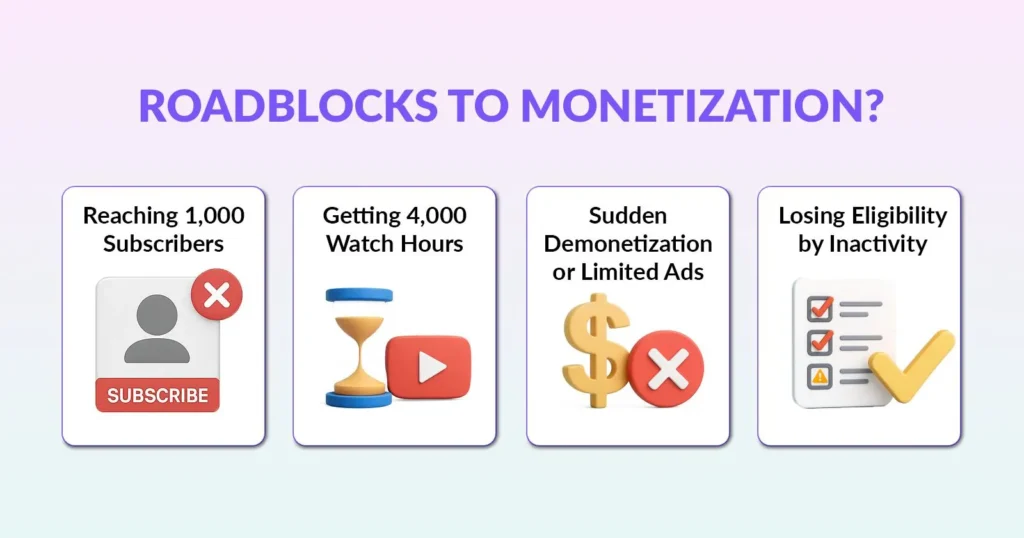
Monetizing on YouTube is exciting, but the journey isn’t without its roadblocks. Many creators run into the same issues on their way to building a steady income. The good news? Each challenge has a practical fix if you approach it the right way.
- Struggling to hit the first 1,000 subscribers and 4,000 watch hours.
- Facing sudden demonetization or limited ads.
- Staying consistent to keep YouTube Partner Program eligibility.
Getting the First 1,000 Subscribers and 4,000 Hours
This milestone feels tough at first because it takes time to build momentum. Focus on value-driven content like tutorials, reviews, or “how-to” videos, formats that naturally draw in search traffic. Pair that with smart promotion on social media or communities where your audience already hangs out. Growth might feel slow at the beginning, but every piece of evergreen content compounds over time.
Dealing With Demonetization
Demonetization can be frustrating, especially if it comes without clear warnings. Review YouTube’s community guidelines regularly and ensure your content is advertiser-friendly. Don’t use copyrighted music or clips, steer clear of sensitive language, and use royalty-free assets whenever possible to avoid demonetization. If you are flagged, appeal the decision promptly and identify the reason for the flag to prevent it from happening again.
Staying Active to Avoid Losing YPP Eligibility
If you stop posting, you risk losing YouTube monetization. Create a realistic posting schedule you can stick to. Even one video a week or bi-weekly uploads can keep your channel active and in good standing.
Final Thoughts
YouTube offers creators more ways to earn revenue, including ad revenue, Shorts revenue sharing, fan funding, sponsorships, and merchandise sales. To monetize YouTube channel in 2026, the key is not relying on a single path, but rather combining several streams to build long-term, stable income.
Want to learn more about growing your channel with professional video editing and strategy? Explore ShortVids’ editing services.
FAQs About YouTube Monetization
CPM rates vary by region. Generally, the U.S., Canada, Australia, and some European countries offer higher ad rates compared to Asia or Africa. But your audience size and engagement matter more than location alone.
In 2026, YouTube continues to update its rules: 500 subscribers and 3,000 valid public watch hours (or 3 million Shorts views in 90 days for early access) qualify you for the Partner Program. Full monetization with ads requires 1,000 subscribers and 4,000 watch hours.
On average, Shorts pay between $50 $500 per million views, depending on your audience location, niche, and ad demand. It’s less than long-form videos, but volume and virality can balance it out.
Yes, but you need to fix the issue first, whether it’s copyright claims, reused content, or policy violations. After resolving it, you can reapply to the YouTube Partner Program.
Focus on hitting the entry requirements: consistent uploads, optimized titles and descriptions, and engaging content that avoids policy violations. Shorts can be a fast track to eligibility.
Yes. If your channel goes inactive for 6 months, violates policies, or falls below the minimum requirements, YouTube can suspend your Partner Program status.
A good CPM ranges between $2 and $10, though niches like finance, business, and tech often see rates above $15. Your niche, audience location, and ad demand make the biggest difference.
Book a Call Today
- Fixed monthly plans starting at $999
- 24-hour turnaround time (or less) on all short-form edits
- 3-layer quality check system on every video
- No more chasing freelancers or managing editors
- Scale up to 50+ videos/month without hiring in-house
- Content team trained on platform trends, scroll-stopping hooks & storytelling
- Fully managed by professionals – you just upload & approve
- Response time: Under 1 hour (US & GCC time zones)
Cut your production costs, not your standards.

